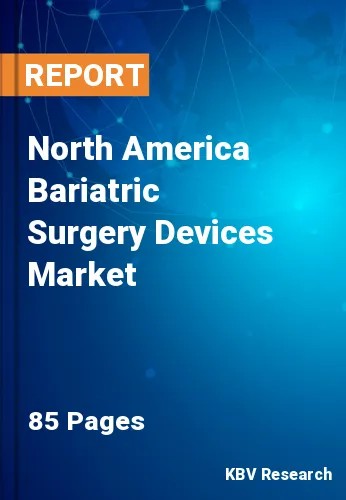The North America Bariatric Surgery Devices Market would witness market growth of 4.7% CAGR during the forecast period (2022-2028).
Making alterations to the digestive tract is a component of bariatric surgery, which includes gastric bypass as well as other weight-loss procedures. When exercise and diet have failed or when patients are experiencing major health issues as a result of high weight, bariatric surgery is performed. The ability to eat more is restricted by several procedures. Other approaches work by making it challenging for the body to absorb nutrients. Some techniques perform both. Even though there are numerous advantages to bariatric surgery, it is a substantial procedure with significant risks and negative effects. To assist assure the long-term success of bariatric surgery, patients must also permanently adjust their diet and engage in regular exercise.
The body's capacity to reach a healthy weight is enhanced by these methods. Each surgical procedure has unique benefits and potential downsides. In order to choose the best operation for the patient, the bariatric surgeon would examine the medical history and consult with the patient. Obesity is linked to a lower quality of life, numerous physical limits, a sense of exhaustion, and physical pain. Many people who have had weight loss surgery say their quality of life has improved as a result of the procedure.
Obesity is another emerging issue in regional countries, which is needed to be addressed as soon as possible. According to the Centers for Disease Control and Prevention, in the United States, the prevalence of obesity was 41.9% from 2017 to March 2020. (2021 NHANES). The prevalence of obesity in the US rose from 30.5% to 41.9% from 1999 to 2000 to March 2020. The prevalence of extreme obesity rose from 4.7% to 9.2% throughout the same period. (2021 NHANES).
Heart disease, type 2 diabetes, stroke, and a few cancer types are all diseases linked to obesity. These are some of the main reasons why people die too young and avoidably. Owing to the high prevalence of obesity along with the increasing efforts of the government to reduce it, the demand and adoption of bariatric surgery are estimated to rise significantly in the region. This factor is boosting the growth of the regional market.
The US market dominated the North America Bariatric Surgery Devices Market by Country in 2021, and would continue to be a dominant market till 2028; thereby, achieving a market value of $640.8 million by 2028. The Canada market is exhibiting a CAGR of 7.1% during (2022 - 2028). Additionally, The Mexico market would experience a CAGR of 6.2% during (2022 - 2028).
Based on Devices Type, the market is segmented into Minimally Invasive Surgical Devices and Noninvasive Surgical Devices. Based on Minimally Invasive Surgical Devices Type, the market is segmented into Accessories, Suturing Devices, Stapling Devices and Energy/Vessel-sealing Devices. Based on Procedure, the market is segmented into Sleeve Gastrectomy, Noninvasive Bariatric Surgery, Adjustable Gastric Banding, Gastric Bypass, Revision Bariatric Surgery, Mini-gastric Bypass and Biliopancreatic Diversion with Duodenal Switch (BPD/DS). Based on countries, the market is segmented into U.S., Mexico, Canada, and Rest of North America.
Free Valuable Insights: The Global Bariatric Surgery Devices Market is Estimated to reach $2.4 Billion by 2028, at a CAGR of 5.3%
The market research report covers the analysis of key stake holders of the market. Key companies profiled in the report include Johnson & Johnson, ReShape Lifesciences, Inc., Apollo Endosurgery, Inc., Medtronic PLC, Olympus Corporation, Intuitive Surgical, Inc., B. Braun Melsungen AG, Spatz FGIA, Inc., Cook Medical, Inc. (Cook Group), and Richard Wolf GmbH.
By Devices Type
By Procedure
By Country
Our team of dedicated experts can provide you with attractive expansion opportunities for your business.

